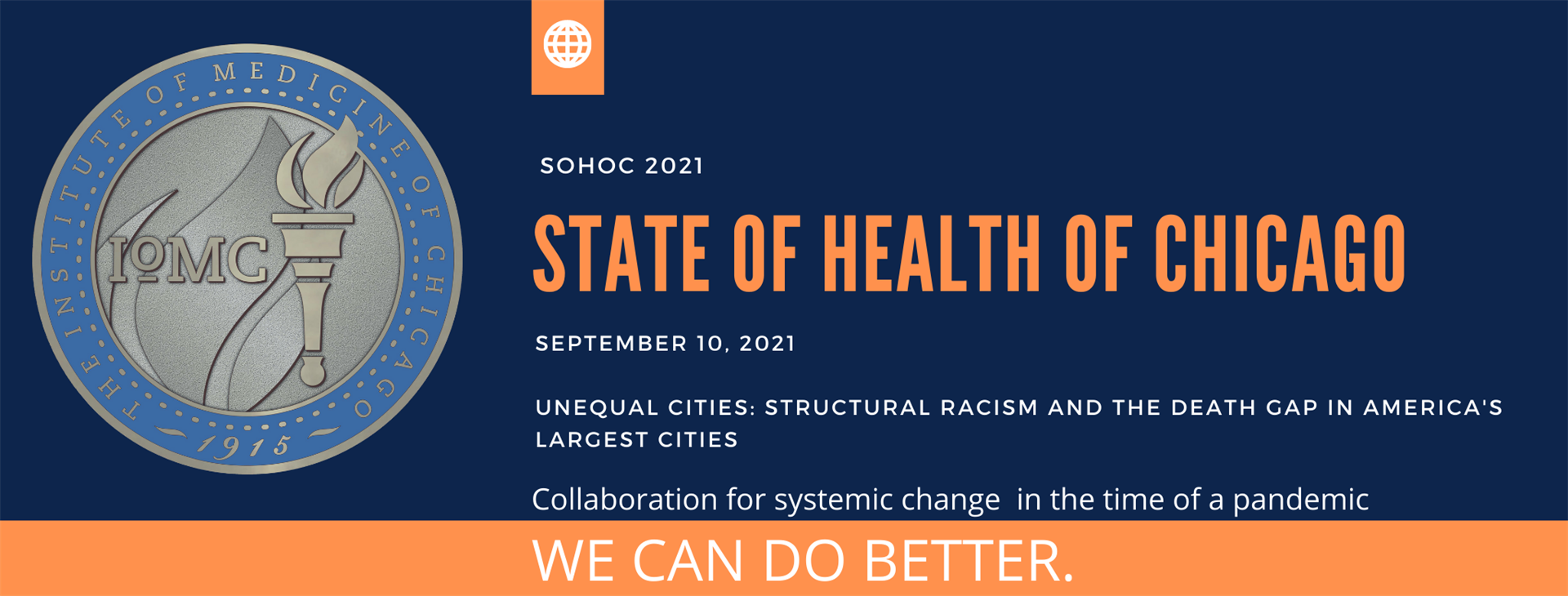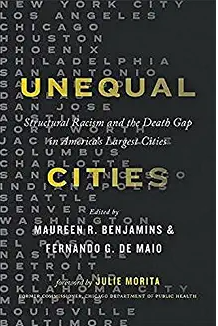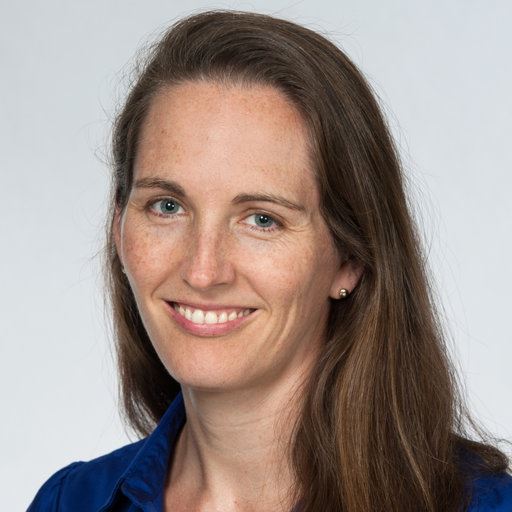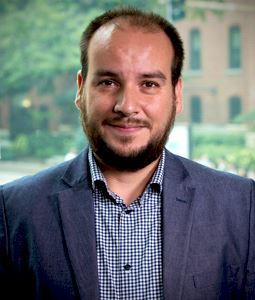
September 10, 2021
Unequal Cities: Structural Racism and the Death Gap
in
America's Largest Cities
(Book Release in September 2021)
Virtual Meeting
12:00 PM CT - 1:00 PM CT
A confirmation is sent immediately upon registration with the virtual link for the day of the event, if you do not receive it, please contact us at iomcstaff@iomc.org.
Complimentary - Open to all
Post-Election — Chicago has a worsening black – white mortality rate ratio in the past 10 years. We can definitely can do better, we must do better and there are signs in other parts of the United States where things actually are moving in the right direction.
 Dr. Maureen Benjamins, PhD and Dr. Fernando De Maio, PhD, will talk about their research and new book Unequal Cities: Structural Racism and the Death Gap in America's Largest Cities scheduled for release in September 2021.
Dr. Maureen Benjamins, PhD and Dr. Fernando De Maio, PhD, will talk about their research and new book Unequal Cities: Structural Racism and the Death Gap in America's Largest Cities scheduled for release in September 2021.
This is a session of the State of Health of Chicago(SOHOC). A series of sessions from September 2020 through December 2021 addressing many topics and related to the COVID-19 pandemic. Dr. De Maio, as a panelist, addressed 'Racial Inequity in Healthcare' at the State of Health of Chicago session in February 2021.
Across the United States, Blacks have shorter life expectancies than whites—reflecting structural racism and deep-rooted drivers of population health. But are some cities more equal than others?
The elimination of racial and ethnic inequities—differences that are avoidable, unnecessary, and unfair—has been one of the overarching health-related goals of the United States for decades. Yet dramatic differences in health outcomes between Blacks and whites persist, rooted in structural and social determinants of health. Nationally, a Black baby can expect to live four years less than a white baby. But mortality outcomes and inequities vary widely across cities. In Washington, DC, for example, the average life expectancy for Blacks is twelve years less than that of whites. But in other cities, mortality differences between races are less striking or nonexistent. If health equity can be achieved in some cities, why not all? This is arguably the most important health equity issue of our time.
By attending this session, you will:
- Discover the ten-year gap in life expectancy between our healthiest and unhealthiest big cities.
- Compare new previously unavailable data on life expectancy, mortality from leading causes of death, and related Black-white inequities for the country's 30 biggest cities.
- Identify the characteristics of cities, including their levels of income inequality and racial segregation, that impact overall health and Black-white inequities.
The first book to specifically examine racial health inequities within and across US cities, Unequal Cities offers a social justice framework for addressing the newly identified inequities, as well as specific case studies to help public health advocates, civic leaders, and other stakeholders envision the steps needed to improve their cities' current health outcomes and achieve racial equity. This book serves as a powerful call to action for health equity advocates and city leaders alike.
We are here to change the landscape, not do more studies. It is about people.


Speakers/Authors
- Maureen Benjamins, PhD, Sinai Urban Health Institute
- Fernando DeMaio, PhD, American Medical Association and Founding Co-Director, Center for Community Health Equity (DePaul University and Rush University) and Fellow of the Institute of Medicine of Chicago
Bios
Maureen Benjamins, PhD is a Senior Research Fellow at the Sinai Urban Health Institute (SUHI). Her research interests pertain to health inequities and the influence of social factors on these inequities. Dr. Benjamins has led several initiatives to study health equity nationally and in Chicago, including the Sinai Community Health Survey 2.0 and the Unequal Cities project, which examines racial inequities in overall and cause-specific mortality across the biggest cities in the U.S. She is the co-editor of Urban Health: Combatting Disparities with Local Data (Oxford, 2012).
Dr. Benjamins developed and directs the Sinai Population Health Institute, an interprofessional institute focusing on health equity and social determinants of health. She also runs the internship and faculty fellowship programs at SUHI. Dr. Benjamins is an adjunct faculty member at Rosalind Franklin University of Medicine and Science and Loyola University Chicago's Parkinson School of Health Sciences and Public Health. She received her BA from Duke University, her master’s and doctorate in sociology from the University of Texas at Austin, and a post-doctoral fellowship in gerontological public health at the University of Illinois at Chicago.
Fernando DeMaio, PhD, is Director of Research and Data Use at the Center for Health Equity, American Medical Association. He is also a professor of sociology at DePaul University, where he teaches social epidemiology and data analysis. His research and teaching interests lie primarily within medical sociology and social epidemiology, with a focus on the concept of structural violence and the social determinants of health. His work has been guided by the notion of 'radical statistics' – the idea that statistical analysis can be used to not just describe the world, but to change it.
Dr. De Maio is the author of Health & Social Theory (Palgrave Macmillan, 2010) and Global Health Inequities (Palgrave Macmillan, 2014), and co-editor of Latin American Perspectives on the Sociology of Health and Illness (Routledge, 2018) and, most recently, Community Health Equity: A Chicago Reader (University of Chicago Press, 2019). His work appears in a wide range of academic journals, including the American Journal of Public Health, Critical Public Health, Global Public Health, the Journal of Health Care for the Poor and Underserved, the International Journal of Epidemiology, and the New England Journal of Medicine. Dr. De Maio is the founding co-director of the Center for Community Health Equity, which was founded by DePaul University and Rush University in 2015. In 2019, he was a Research Fellow at the Sinai Urban Health Institute. He received a BA (Hons.) degree in Sociology and Economics from the University of Toronto, and his MA (Sociology and Health Studies) and PhD (Sociology) degrees from the University of Essex.
Suggested readings
Benjamins MB, Silva A, Saiyed N, DeMaio F. Comparison of All-Cause Mortality Rates and Black:White Inequities in Rates Across the 30 Most Populous U.S. Cities<https://jamanetwork.com/journals/jamanetworkopen/fullarticle/2775299>. JAMA Network Open, 2020; 3(12):e2032086. doi:10.10001/jamanetworkopen.2020.32086.
Schober D, Hunt B, DeMaio F, Saiyed N, Silva A, Homan SM, Benjamins MR. Homicide Mortality Inequities Across the 30 Biggest Cities in the United States<https://pubmed.ncbi.nlm.nih.gov/33221143/>. American Journal of Preventive Medicine. 2021. Mar;60(3):327-334. doi: 10.1016/j.amepre.2020.09.008. Epub 2020 Nov 19.
CEU 1.0

Thank You to Our Sponsors
Benefactor 
Friend


Innovator




Colleague



Sponsorship opportunity- download the sponsorship brochure here.
Questions? Contact us at iomcstaff@iomc.org or call us at 312.709.2685.
###